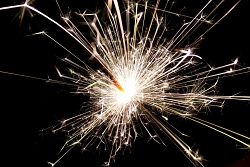Remember, remember, Cedrec's safety and environment tips, on the 5th of November...
Guy Fawkes' Night is a night enjoyed by many, but the night can be hazardous both from a safety and environmental perspective.
Fireworks and the environment
The Environment Agency has asked if you are going to celebrate bonfire night, go to an organised event rather than risk being a "bonfire bandit".
Bonfires can have an impact on the climate, because if the wrong materials are burned, they can harm wildlife, the environment and human health.
There are strict rules on what can, and can't be burned in bonfires to avoid environmental harm. As well as the harm and nuisance burning the wrong kind of waste can cause, burning of most types of waste is illegal and can carry a fine of up to £50,000.
Bonfire dos and don'ts for the Environment
- the only materials that should be used in bonfires are dry, untreated and unpainted wood, and small amounts of paper or cardboard;
- do not use wet wood, as this creates smoke which can spread and cause a nuisance to neighbours, and can cause the bonfire to quickly get out of control if not properly managed;
- if you are planning on having a bonfire at home, do not dispose of household waste, such as plastic rubber, glass, oils or metal. These materials can cause a pollution risk to water, air, soil, plants, animals, or the countryside. These materials should be disposed of through recycling or household waste collections, or at council recycling centre;
- always check the bonfire for hedgehogs and other wildlife before setting light to it, and do not allow anyone else to add materials to the bonfire other than clean, dry, untreated wood;
- the Environment Agency urges both homeowners and businesses to be aware of what they are burning. If you are paying someone to take waste away, check they are licensed waste carriers who will dispose of waste correctly, as illegal waste operations may use bonfire night as a way to dispose of hazardous and inappropriate waste.
Fireworks and safety
The Royal Society for the Prevention of Accidents (RoSPA) say that despite annual safety warnings, firework celebrations still end in painful injuries for too many people, including very young children.
You can be fined an unlimited amount and imprisoned for up to six months for selling or using fireworks illegally. You could also get an on-the-spot fine of £90.
Injury figures support the advice that the safest place to enjoy fireworks is at a large public display as far fewer people are injured at these events compared to smaller family or private parties.
Bonfires dos and don'ts for Safety
- only adults should deal with setting up firework displays, lighting fireworks, and safely disposing of fireworks;
- do not drink alcohol if handling fireworks;
- children and young people must be supervised and kept a safe distance from the fireworks;
- plan your firework display to make it safe and enjoyable, and do not let fireworks off during night hours (11pm to 7am);
- in England, Scotland and Wales only buy fireworks which carry the UKCA marks, and in Northern Ireland look for the UKNI symbol;
- do keep your fireworks in a closed box, and use them one at a time after reading and following the instructions on each firework;
- do light fireworks at arm's length with a taper and stand well back, keeping naked flames and cigarettes away;
- do not return to a firework once it has been lit, put fireworks in your pockets or throw them;
- always direct any rocket fireworks well away from spectators;
- do not use paraffin or petrol on a bonfire;
- do make sure the fire is fully out and surroundings are safe before leaving;
- make sure sparklers are not given to under-5s, that everyone wears gloves, hold sparklers at arm's length, and put in a bucket of cold water when finished.
Properly organised events
Attending an organised event instead of having a bonfire at your home or business, is the easiest way to celebrate Bonfire Night safely and be environmentally friendly.
Kevin Baker of the Environment Agency said: "We want people to have fun on Bonfire Night – but to do so safely and in a way that won’t create a risk to the environment, wildlife and to you and your neighbours".
"The best way of doing that, is to stop burning waste altogether and go to a properly organised community event, where organisers, hopefully, should have followed our guidelines and won’t be causing a hazard".
Ros Clarke, group manager for prevention at Devon and Somerset Fire and Rescue Service, said: "Bonfire night and the days surrounding it can be busy for us, and our emergency service colleagues. The safest way to enjoy bonfire night is to go to an organised professional bonfire night event, rather than holding your own bonfire".

